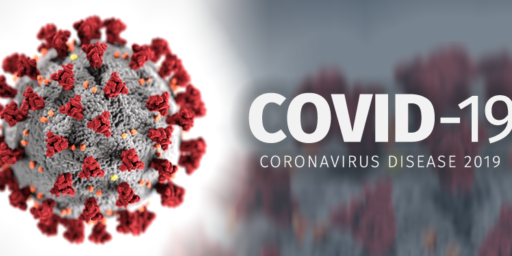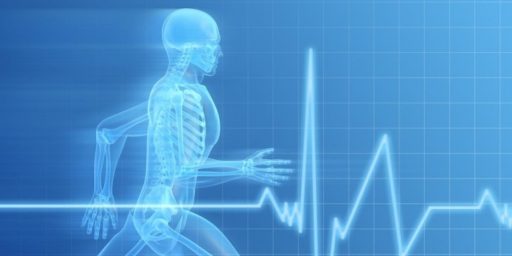Increase US Life Expectancy Without Increasing the Power of Government
Following up on this post about US life expectancy at birth by Dr. Joyner last Friday, it occurs to me that there’s a quick and easy step the federal government could take that would significantly increase our life expectancy almost overnight. Unfortunately, while it would without a doubt have a much more profound effect on that metric than even the best-case (read: ‘most unlikely’) scenario for government-run health care, it’s also all but certain that the feds won’t actually try it.
As Dr. Joyner noted last week, “when we control for traffic fatalities and homicides, ‘The US jumps from 15th on the list with a life expectancy of 75.3 to 1st with a life expectancy of 76.9.'” Traffic accidents are a fact of life in a country as spread out — and dedicated to its cars — as ours is. We might be able to make policy changes that could reduce their number, but we’re probably not going to remove them as a factor absent major technological improvements in vehicle safety.
 Homicide, however, we could impact immediately and irrevocably right now simply by decriminalizing most (or all) currently illegal drugs. Remove the artificial, government-created scarcity, and the profits and incentive to engage in underworld violence that goes with it, and the homicide rate would fall significantly. More of our young men would survive to middle adulthood, hundreds of thousands of prisoners would be freed (or never created) to engage in productive work, and our life expectancy at birth would jump immediately and permanently. All without the government having to nationalize one-sixth of the economy and expropriate trillions more dollars from the private sector to pay for the hope that the outcome will be improved.
Homicide, however, we could impact immediately and irrevocably right now simply by decriminalizing most (or all) currently illegal drugs. Remove the artificial, government-created scarcity, and the profits and incentive to engage in underworld violence that goes with it, and the homicide rate would fall significantly. More of our young men would survive to middle adulthood, hundreds of thousands of prisoners would be freed (or never created) to engage in productive work, and our life expectancy at birth would jump immediately and permanently. All without the government having to nationalize one-sixth of the economy and expropriate trillions more dollars from the private sector to pay for the hope that the outcome will be improved.
Obviously this is just one idea and will not solve much else that needs fixing about our health care system. But the confidence we can have that it will have the desired effect on improving life expectancy (and related health and crime problems) is orders of magnitude higher than that for letting government run the whole system. And, yes, it would probably result in higher rates of other kinds of drug-related health issues. Of course, we would also free up tens of billions of dollars in resources now wasted pursuing, prosecuting, and incarcerating drug offenders, some of which could then be directed toward ameliorating those issues. Even without considering the myriad other benefits decriminalization would bring to liberty and the treasury, the cost-benefit analysis is incontrovertibly in favour.
The single biggest problem with this plan is, of course, that it requires that the government give up power it has appropriated to itself. As no lesser authority than Thomas Jefferson noted, “the natural progress of things is for liberty to yield and government to gain ground.” Accordingly, it is far, far more likely that the government will persist in its efforts to increase its power by taking over the health care system than it is that it will yield power it already holds, even if the latter would actually have a more felicitous effect.






I’m sympathetic with the idea of declaring victory in the War on Drugs and going home. But you don’t make the network of drug dealers go away with mere decriminalization. And if you have the black market, you still have the violence, since drug dealers can’t very well go to the police if they are robbed by their customers or muscled aside by rival vendors.
To abate the violence associated with the drug trade, you would have to go to full legalization, which would mean something like allowing the sale of meth and crack in liquor stores, or perhaps in carefully controlled amounts with a doctor’s prescription (and if the latter process is too onerous the black market will remain).
I happen to think that full legalization of hard drugs is not self-evidently ridiculous, but it is comically untenable politically.
This would be a win – win imo. The gov’t can tax the sale of it to pay for this crazy healthcare bill and all of the other big plans they have and as a *Bonus* we can cleanse the genepool of the more stupid of our society.
I wonder what the economics of this legalization would look like. The foot soldier on the corner would be out of a job. Given that he has already made a decision that crime is preferable to other economic options, would this really reduce homicides or would it push that person into other crime activities (that may or may not include killing). Would we be transferring the killings from lower economic strata into the middle class (e.g. from home invasions).
It is the unintended consequences that you really need to control for.
I support this proposal in principle with respect to marijuana and perhaps some other drugs, but can’t abide the thought of making things like heroin and cocaine legal and freely available. Maybe that’s a failure of imagination on my part.
Legalizing and taxing marijuana seems a good idea. If the taxes imposed kept the street price relatively constant, then consumption would not increase dramatically while the government could avoid some costs (investigating and prosecuting marijuana-only drug crimes) and collect higher tax revenues. (And incidentally, the resulting quality of marijuana sold would probably be improved as sellers competed for market share.)
On the other hand, if taxes on the product are high enough to maintain current prices and generate the tax revenue hoped for, then there will be smuggling, just like with cigarettes now. This is a legitimate fear because there is an existing smuggling and distribution infrastructure that would compete with the legal system. Legitimate retailers would probably end up supporting a black market, which would have many of the same undesirable characteristics of today’s drug trade.
You can’t control for them; that’s why they’re called “unintended.”
BTW
Actually, I think that may the second biggest problem, the first may be the millions of folks who think the war on drugs, the devil’s product, is just peachy.
Sam,
I think you are mistaking unforeseen for unavoidable. Liberals seem to have a hard time with thinking beyond the obvious to what are the secondary consequences.
The cash for clunkers is a good example. We already had about 70K cars on the list being traded in during an average month. Add in about 100K who delayed the purchase for the program to start and another 30K for those who moved up their purchase decision and you can understand why a 5 month program ran out of money in 5 days. It is this sort of failure to think even a little ways around the corner that really makes the liberals so dangerous on health reform.
Quite right, we’ve spent far to long convincing the public that drugs and bad and dangerous for there to be enough public support for this measure to be politically possible.
You say that like it’s a problem limited to Liberals.
No free ponies:
The number of deaths saved by ending prohibition has to be offset by the number of deaths caused by increased access to drugs.
Keep in mind that you’re basically trading the deaths and problems associated with criminalization (organized crime, turf wars, theft and murder by addicts) for those of legalization (greater substance abuse, probably a rise in DUIs, etc). In the case of marijuana, I think you can make a case for legalization – it’s certainly not any more dangerous than cigarettes or alcohol.
With cocaine, I’m not sure. It was used extensively in patent medicines around the late 19th/early 20th, and there was widespread addiction, but it didn’t appear to have any overtly bad consequences for society as a whole (plus, it’s tempting to rip the rug out from under an entire New World crime trade centered around it).
With Meth and Heroin? Very, very iffy. Meth is horrendously addictive (much worse than cocaine), so I’d need some pretty solid arguments that it can be managed well. Same for heroin.
Not free ponies, but close.
As I’ve said every time this topic comes up, you wouldn’t just make drugs freely available one day. You’d need to regulate them in some way, whether it was like prescription drugs or alcohol or some other model. (Side note: The problem with the prescription model is that few doctors sworn to the Hippocratic Oath are going to prescribe meth to anybody, meaning a black market would still be viable).
Regardless, we’d STILL have a buttload of money left over to actually treat the disease of addiction, rather than just incarcerating everybody who smokes a bag on the weekend.
Done this way, I think the number of deaths would go down dramatically, both from the treatment and the reduced drug violence. Not exactly “free” ponies, but probably done with significantly fewer resources than those currently dedicated to the War on Drugs.
Well, the expression ‘unintended consequences’ implies that the consequences were unforeseen, for had they been foreseen, they would have been part of the intended consequences of the action. I don’t think you want to argue that foreseen effects of an action can be both foreseen and unintended. Criminal defense attorneys would love a proof of that proposition.
Some more Jefferson for you, then: “I would rather be exposed to the inconveniencies attending too much liberty than to those attending too small a degree of it.”
That’s not even a close contender with trying to wrest power back from government.
I would strongly recommend Moskos’ book Cop In The Hood. Drugs are freely available now. The prices have essentially not changed, adjusting for inflation, in many years. There is little reason to think that there will be a big increase in consumption. Lots of good reasons to believe there would be fewer homicides and a lot fewer people in jail.
Agree with Sam (?) above. This is not an issue of govt. wanting to give up the power, but rather a large group of citizens who think it immoral to legalize drugs. Part of that family values thing.
Steve
Overcoming it is the predicate for the wresting of power from the government. Good luck with that at this time.
I don’t agree. I don’t expect that full decriminalization could be done in one fell swoop, obviously. But we could legalize pot tomorrow and there’d be little if any complaint. The others would follow in due course. We could have the whole thing ratcheted down by 2015 if we had leadership that was committed to reducing the power of government instead of massively expanding it.
I’d like to believe that, I really would, but I’m afraid I don’t. Oh, large parts of the society would be in favor, but I think larger and more vocal parts wouldn’t. And until the majority of the populace reaches a point similar to that it did prior to repeal of the 18th Amendment, I don’t see the War on Drugs going away.
In the case of marijuana, I think you can make a case for legalization – it’s certainly not any more dangerous than cigarettes or alcohol.
Lots of good reasons to believe there would be fewer homicides and a lot fewer people in jail.